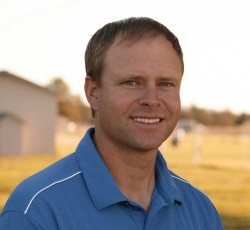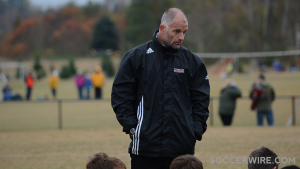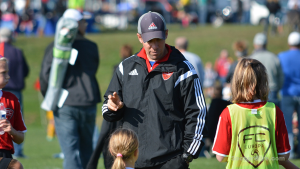Ten reasons you shouldn’t coach your own kid, and what to do if you absolutely must

Picture a coach. What do you see? Guy with a clipboard, whistle and hat? Woman in shorts, cleats and collegiate jersey? Chalk talk? Dry-erase board? Yelling? High-fiving? Someone you know? Someone you don’t?
Bet the one person you didn’t just picture is you. Could you? Should you? Would you? Have you?
+READ: Brainstorming a coaching curriculum for parent coaches
When kids want to play youth sports, they need coaches.
Should you coach your own kid?
I surveyed parents, parent-coaches, professional coaches and coaching educators and most gave me an immediate, “NO WAY!” Some, who are bit more PC, said “not any more,” or “it’s best not to.”
Here are some reasons they gave:
- Parent-coaches tend to favor their own kids.
- Parent-coaches tend to be harder on their own kids.
- Parent-coaches tend to be unaware of how they’re behaving with their own kids.
- Parent-coaches think they’re more qualified than they are.
- The other kids, who are your kid’s friends.
- The other parents, who used to be your friends.
- Kids have trouble separating Dad/Mom as parent from Dad/Mom as coach.
- A kid never forgets the time you yelled at him in front of 100 people, even though it was supposed to be fun, and you apologized profusely afterwards.
- The car ride home…with the losing coach.
- Better coaching, more clubs and more avenues to consider these days.
 The reality, however, is that many parents, as many as 75-80 percent (according to research John O’Sullivan did for his book Changing the Game) do end up coaching their own child.
The reality, however, is that many parents, as many as 75-80 percent (according to research John O’Sullivan did for his book Changing the Game) do end up coaching their own child.
Paul Shaw, Director of Coaching Education for the Virginia Youth Soccer Association, agrees. Although coaching your own child may not be preferable, it’s often unavoidable, Shaw says. The reality often comes down to “no coach, no team.” Especially in the early years, Mom or Dad often get called upon to coach.
Perhaps in a perfect world, we’d find the perfect coach for them and sit delightedly (and quietly) on the sidelines, shouting only encouragement to players on both teams, while we happily chatted with the other parents and then gathered for pizza afterwards, sharing stories about something OTHER than soccer.
However, I don’t know anyone who ACTUALLY lives in THAT world, and hey, you’re driving them to practice already. How hard can it be, right?
Plenty hard, most coaches say, even those who have found a way to make it work with their own kids.  Here’s what we suggest:
Here’s what we suggest:
- Limit yourself to recreational level (and unpaid).
- Ask someone to videotape one of your first several games as coach, so you can “see” and “hear” yourself coaching. Make sure you watch the video!
- Praise your own kid as much as you praise other players.
- Put your assistant coach in charge of constructive criticism for your kid, and you do the same for his/her kid. Even better, have an assistant without a kid on the team.
- Discipline privately to keep parenting separate from coaching. When parenting (with regard to behavior rather than sport performance) pull them aside and say, “This is Dad/Mom talking…knock it off!”
- Leave your coach hat and whistle at the field. No one is worse to ride home with than the losing coach.
- Lay out the team goals and expectations for the parents and players before the season, and consistently follow through with them.
- Beware of the “playing time” quagmire. When wins matter, who gets to play and for how long gets emotional (read: Dr. Banner turns Incredible Hulk). You, as coach, will be the target of their emotional outbursts, and, as a parent, will never be completely unbiased (see #1 and #2 above). First and foremost, all parents come to the game to watch their own kid play. Every minute their kid sits on the bench disappoints. Address playing time allocation decisions pre-game, pre-season, even pre-team, if possible. If playing the game is more important than winning the game (which most of us SAY we believe), then use a rotating minutes clock and even a rotating positions clock. Nothing engenders appreciation for your goalkeeper like having to give it a try yourself. And who knows, you may stumble on undiscovered ability!
- Know when to let go and pass your kid on to a different coach and/or a different team.
- Whenever you can, don’t coach your own kid, so you can just be the parent. Then, having served your turn as coach, cut the new coach some slack.
Coaching is a noble profession, I have been told. It also leaves a lasting impression. So, it’s not a decision we make lightly.
 Even if you played the game, have your coaching license and are great with kids, things are always different when it’s our own child. As a friend pointed out, “I am a certified teacher, yet I could never home school my own kids. But some people do, and they are great at it.” Are you that kind of teacher? Do you have that kind of relationship?
Even if you played the game, have your coaching license and are great with kids, things are always different when it’s our own child. As a friend pointed out, “I am a certified teacher, yet I could never home school my own kids. But some people do, and they are great at it.” Are you that kind of teacher? Do you have that kind of relationship?
Here are some great questions to consider, suggested by John O’Sullivan in his book, Changing the Game. He cautions, if one of your answers raises some red flags, think long and hard about taking on a coaching role for your child:
- What is my relationship with my child, and how will coaching her affect that relationship?
- What is my relationship with the other children on the team, who may be my child’s friends, and how will my coaching affect those relationships?
- How will my coaching affect my relationships with the parents of my child’s teammates?
Can our coaching help make this a good experience for our kids?
Well, as a friend pointed out, we SHOULD coach our kids in life. Um, yeah. That’s the task we are given. Is the playing field a practice zone for this? A training ground? If it’s a mirror, how are we doing?
Go ahead, picture a coach. Who do you see?
I can still see the coach who spoke a few words to me on a softball field in Olney, Maryland when I was probably 12 or 13 years old. It was extra innings. One run wins it. He called me over, as if to whisper a secret strategy, but all he said was, “Wendy, send us all home.” Yup. I hit the next pitch over the center fielder’s head, circled the bases and we all went home. Never forgot those words. I hope I’ll never forget that feeling.
There’s just something about someone who knows and believes in you that can make a lifetime of difference. A coach has the unique opportunity to be that person. If you know Mr. Barcikowski — his daughter Donna has a mean fastball — please tell him thank you from me.
(Originally published in May 2015)
My thanks for comments and consultation for this article to many coaches: Diane Drake, Chris Hummer, Mike Jorden, Fred Matthes, many Facebook friends (!)
Paul Shaw, VYSA Coaching Education
Sam Snow, USYS Coaching Education
US Youth Soccer “Coach Your Own Kid in Soccer” blog
John O’Sullivan, Changing the Game Project
and of course, Coach B.
SOCCERWIRE MARKETPLACE
- Girls College ID Soccer Camp – Showcase Your Skills!
- Real Colorado Cup 2026
- Join a College Coaches Showcase Camp Today
- MICFootball Punta Cana 2026
- Dana Cup Hjørring 2026
- 15th Annual Loudoun Soccer College Showcase
- OFFICIAL FC BARCELONA SOCCER CAMPS - PROMO CODE: FCBSOCCERWIRE
- New England Copa Surf 2026
- Adidas National Cup 2026
- visitRaleigh.com Showcase Series 2025, hosted by NCFC Youth











